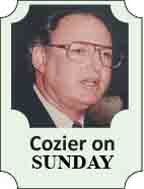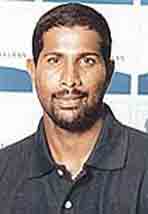As one who has written as many words to fill the public library on behalf of the West Indies Players Association (WIPA), Dinanath Ramnarine’s comment last week suggested that the penny had finally dropped.
“Cricket fans are not hearing much about cricket these days,” WIPA’s long-serving president and chief executive said prior to Monday’s start of negotiations with the West Indies Cricket Board (WICB) for a new Collective Bargaining Agreement (CBA) and Memorandum of Understanding (MOU).

They were, he acknowledged, “caught in the middle, listening to rhetoric and legalese they don’t want to hear.”
What they did want “is the West Indies back at the top of world cricket winning game after game.”
It is a mantra with which the WICB would surely concur.
On the surface, the mood on both sides appeared conciliatory prior to the negotiations. The WICB declared itself “immensely pleased with the commencement,” WIPA “welcomed” it.
Both should now be aware that the stakeholders (identified by the WICB as players, fans, sponsors, media, governments, broadcasters, local and regional administrators, umpires, curators, scorers, and the international cricket community) have had their fill of the nonsense. They must understand the likely repercussions of failure over the coming weeks.
Yet Ramnarine’s sentiments were embedded in a document of no less than 1,400 words previewing the WIPA’s position. As it included much of the “rhetoric and legalese” fans “don’t want to hear,” it was a puzzling contradiction.

True to form, the WICB felt compelled to respond next day in language similarly irksome to the ordinary follower. It was almost identical in length and tedium.
The two didn’t take long pointing angry fingers at each other. It is a game in which they have become well versed.
Ramnarine charged that the relationship “could not continue to be one-sided in favour of the WICB and that West Indies cricket could never again achieve the pinnacle of cricketing success if it continued to remain so.”
The WICB’s view was that “the affairs of West Indies cricket cannot continue to be conducted in a setting where cricket is always held hostage to the threat of player strikes or where negotiations or discussions always descend into a war of attrition.”
In neither communiqué were there many signs of “a spirit of compromise and conciliation.”
Yet the two can no longer fail to recognise that such open, destructive wrangling has long since left the public bored, confused, fed up, indifferent or vexed (take your pick).
Who has won how many arbitrations and mediations, who was right or wrong in the various actual and threatened strikes or who broke up what meeting are no longer relevant, if they ever were.
It would be a welcome change to have the WICB and the WIPA pulling together and concentrating on the cricket so that the team can prise itself out of the lowly position on the International Cricket Council (ICC) standings to which it has so long been locked.
Regrettably, more detailed examination of their positions diminishes optimism that they will become any more understanding of each other, when, even if, a new CBA and MOU are agreed upon.
After the initial pleasantries, last week’s statements degenerated into familiar assertion and denial, charge and counter-charge.
Ramnarine revealed that, for the first time since the first such meetings, he wouldn’t be one his association’s representatives.
While it seemed more than coincidence that it followed the WICB’s official protest on his alleged conduct at a meeting between the two in June, he said it was because he wanted to be “free to focus on the flow of the negotiations.”
Instead, he announced “two independent and impartial leaders in Caribbean dispute resolution,” Dave Kissoon and Michael Hall, as the WIPA’s team.
He said he hoped the WICB would reciprocate by removing “any existing barriers to successful negotiations.” It didn’t require a degree in semantics to know that the “existing barrier” was the WICB’s chief executive, Ernest Hilaire.

The WICB took no heed. Not only did it appoint its chief executive one of its negotiators but noted that Hall and Kissoon are WIPA directors who “cannot properly be considered independent and impartial parties to the process.”
It was an unnecessary example of the one-upsmanship typical of their many previous standoffs.
More followed.
Ramnarine claimed that the WICB was planning to end the CBA “unilaterally.”
“If this happens or if there is no continuity clause, we could be forced to come up with our own system that we think complies with the applicable laws, knowing that each and every aspect of it is potentially the subject of years of litigation and uncertainty” he said.
Not so countered the WICB.
It asserted that it had “no intention of unilaterally changing or repudiating any agreement between the parties.” But, it added, it “certainly does not accept that the MOU and CBA negotiated in 2005 were intended to remain unchanged in perpetuity.”
Ramnarine referred to “indications that the WICB is already considering varying the Provident Fund for players and placing limits on all other player benefits.”
The WICB retorted that this was “totally untrue,” telling the WIPA that “it serves no useful purpose to peddle such untruths particularly at such a delicate period.”
Still, it accepted that it opposed the present system under which “about 82 per cent” of all players’ payments go to international players because it leaves those at regional level “struggling to make a sustainable living and career from cricket.”
It was an opinion echoed by Ramnarine who warned against ending up with an arrangement where “a disproportionate amount of money goes to ‘stars’ and where lesser players struggle for survival.”
“The very concept of a team would be rendered virtually inoperable,” he said.
For all the posturing, this, at least, appeared one area of agreement, a concept that West Indies cricket desperately needs between the two organisations charged with ensuring its well being.
Alas, based on last week’s statements, the portents are still not encouraging.





